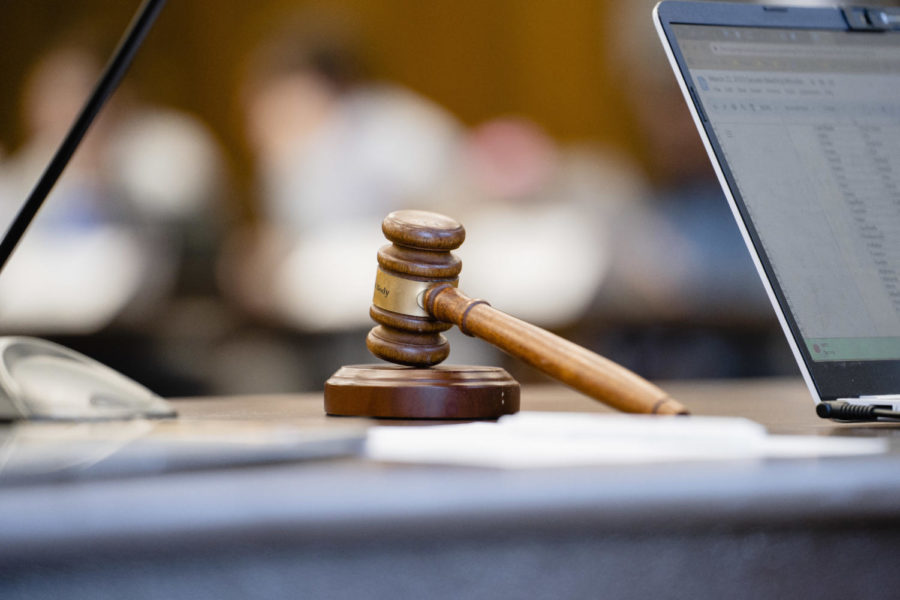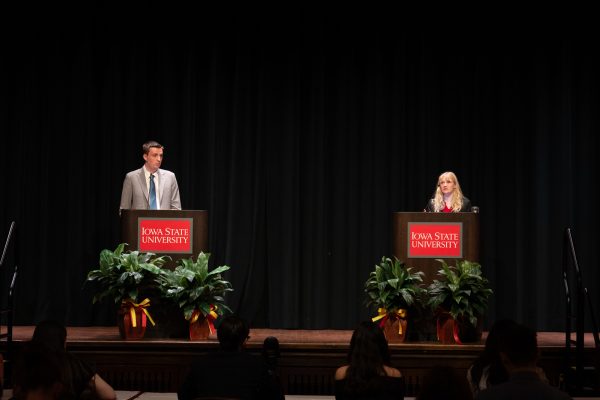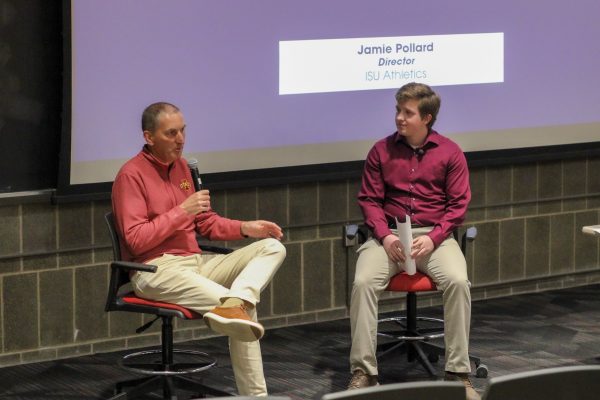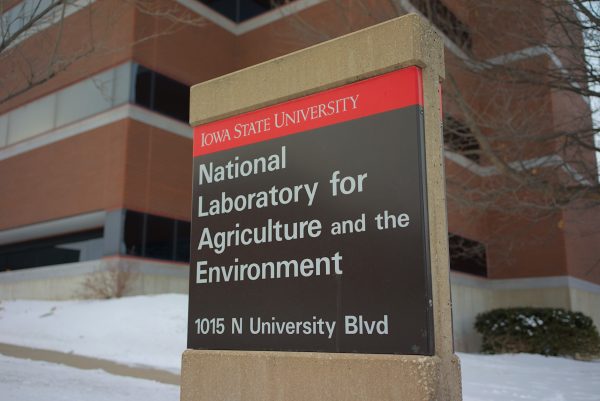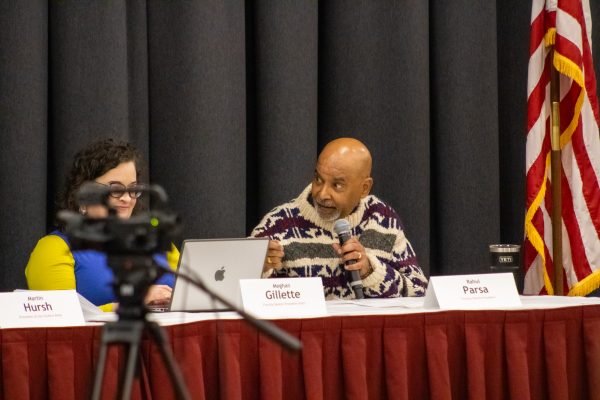Voters fail to receive ballots in Student Government election
Student Government meeting, Memorial Union, Mar. 22, 2023.
When Phoebe Ditrinco opened her school-issued email account, she was prepared to cast a vote for Student Government’s 2023 election. But as Ditrinco tediously searched the folders of her inbox, her efforts came up empty.
Ditrinco is one of at least 20 eligible voters who said they did not receive or could not find a mass email containing a link to the 2023 Student Government election ballot.
The election took place March 7 and 8 via individualized links sent to eligible voters in a mass email. Voting links could not be sent from one student to another.
Ditrinco said she received a voting link after contacting Student Government’s election commission. An additional 19 voters also received a voting link after emailing the election commission, according to Student Government’s adviser, Sophia Sarver.
“Everyone who reached out was able to vote,” said Cody Neeper-Burris, the Student Government election commissioner for the 2023 election cycle and a senior studying political science.
Sarver said she stayed up until the election closed at 11:59 p.m. March 8 to ensure the election went smoothly. Eligible voters included students who were currently registered during the election date, according to Sarver.
“I did stay up to make sure if students needed to access it,” Sarver said. “I was like ‘I want to make sure everyone can vote, so that’s the least I can do.’”
The Student Government election saw 1,972 voters this year, according to Neeper-Burris. This is a drop from 3,231 voters in 2022 and 5,046 voters in 2021.
Until this year, the Student Government elections were handled by the Center for Survey Statistics and Methodology (CSSM). CSSM conducted the Student Government elections from 2016 to 2022, for seven years total, according to an email statement from Allison Anderson, the Survey Research Services Manager for CSSM.
Neeper-Burris said she and Sarver met with CSSM in fall 2022, where CSSM said they would not continue to handle the Student Government elections.
“They [CSSM] expressed that running elections for Student Government is not what they typically do, or what the organization is for, and that they kind of stepped in to help us out,” Neeper-Burris said. “But they were wanting to shift their focus to what their actual focus is, so they asked us to find an alternative means of conducting elections.”
CSSM is an academic center in the ISU Statistical Laboratory that specializes in research and practice for sample surveys, according to their website.
In light of CSSM’s decision to leave the Student Government elections, Neeper-Burris and Sarver looked for alternative methods to run the 2023 election and decided to take the responsibility on themselves.
“Sophie and I did some research on how, like, who can fill this gap, and we were like ‘I think we can do this ourselves,’” Neeper-Burris said. “So that’s what we ended up doing this year.”
When CSSM conducted the elections in previous years, Student Government sent the information to CSSM, and CSSM created everything and placed the information onto the ballot.
Anderson stated the election process CSSM used in previous years did not involve personalized ballot links via email.
“A global email announcement [mass email campaign] containing a hyperlink to the vote.iastate.edu webpage was distributed each election day,” Anderson stated in an email. “From there, students were instructed to click on a ‘Vote Now’ button and log in using their ISU Net-ID to access their personal ballot.”
Anderson stated the information CSSM used for the mass email campaign was provided by the Registrar’s Office, and Student Government worked with IT Services to coordinate the mailing effort.
Bridget Hepworth, customer success analyst for IT Services, said IT Services creates the mass email campaign through their mass email service, Constant Contact.
“We just kind of go off of a template that the customer fills out, and we just use whatever information they input and then send some drafts for approval back and forth, and then send it out for a scheduled time,” Hepworth said.
Hepworth said IT Services does not have a record of Student Government submitting a request for a mass email. Hepworth also said Constant Contact does not show that the election ballots were sent through Iowa State’s IT Services account.
Hepworth said several other university departments have their own Constant Contact accounts but does not know what their processes look like.
Sarver declined to comment on the system Student Government used to send their ballot links this year.
Hepworth said that if the election ballots were sent using Constant Contact, people who have unsubscribed from any previous communications would not have received the email.
“The most common reason we find is that they [intended email recipients] aren’t subscribed, and didn’t realize they’re unsubscribed from every single email that would come from Constant Contact,” Hepworth said.
Hepworth also said that students who have adjusted their information release settings in AccessPlus would also not receive an email, because this would take them off the email list.
Ditrinco said she has not changed her information release settings, but she did block the symptom survey emails the university sent out each day during the COVID-19 pandemic in 2020.
Ditrinco said she received an email last year for the 2022 Student Government election and does not know why she did not this year.
Ditrinco was planning to vote in the election to support her friend running for presidency. However, she did not realize the ballot was sent out until her friend asked if she had voted.
“There’s no one to be mad at, but I did have to go figure out who to contact to get a ballot,” Ditrinco said.
Ditrinco said her friend gave her an email to reach out to the Student Government election commission who sent her a ballot link within an hour of her reaching out.
“It was pretty fast, but I wouldn’t have guessed that email right off the bat,” Ditrinco said, “so I’m glad I knew someone who was involved.”
Ditrinco said she conducted an in-depth search of her email inbox while looking for her ballot link. She asked her roommate for the sender’s contact information so she could search their name in her inbox and all her folders. Ditrinco also checked her inbox’s spam folder.
“I was like ‘Oh, I don’t want to email them and have them be like ‘You got one, you just didn’t check hard enough,’” Ditrinco said. “But no, I actually didn’t get one.”
Ditrinco said she still would have voted if her friend had not been running in the election. However, she said she would not have voted without receiving the election email because she would not have known about it otherwise.
Neeper-Burris said the election commission was not able to accomplish all their goals this year, including outreach efforts, due to having a smaller staff and their amplified responsibilities in this year’s election.
Student Government had four students working primarily on the election commission, compared to previous years where they had 10 people, according to Neeper-Burris.
“We were working with a significantly smaller team in election commission,” Neeper-Burris said. “So we weren’t able to, like, meet all of the things, like, all of the goals that we had set out.”
Your donation will support the student journalists of the Iowa State Daily. Your contribution will allow us to purchase equipment, send our student journalists to conferences and off-set their cost of living so they can continue to do best-in-the-nation work at the Iowa State Daily.


